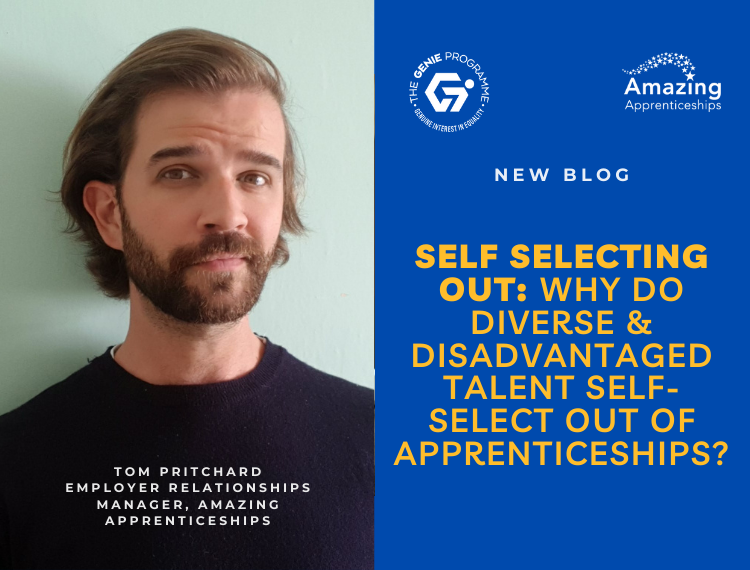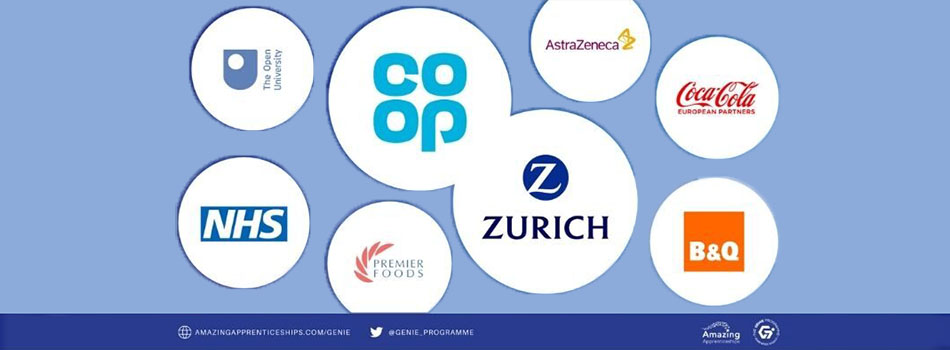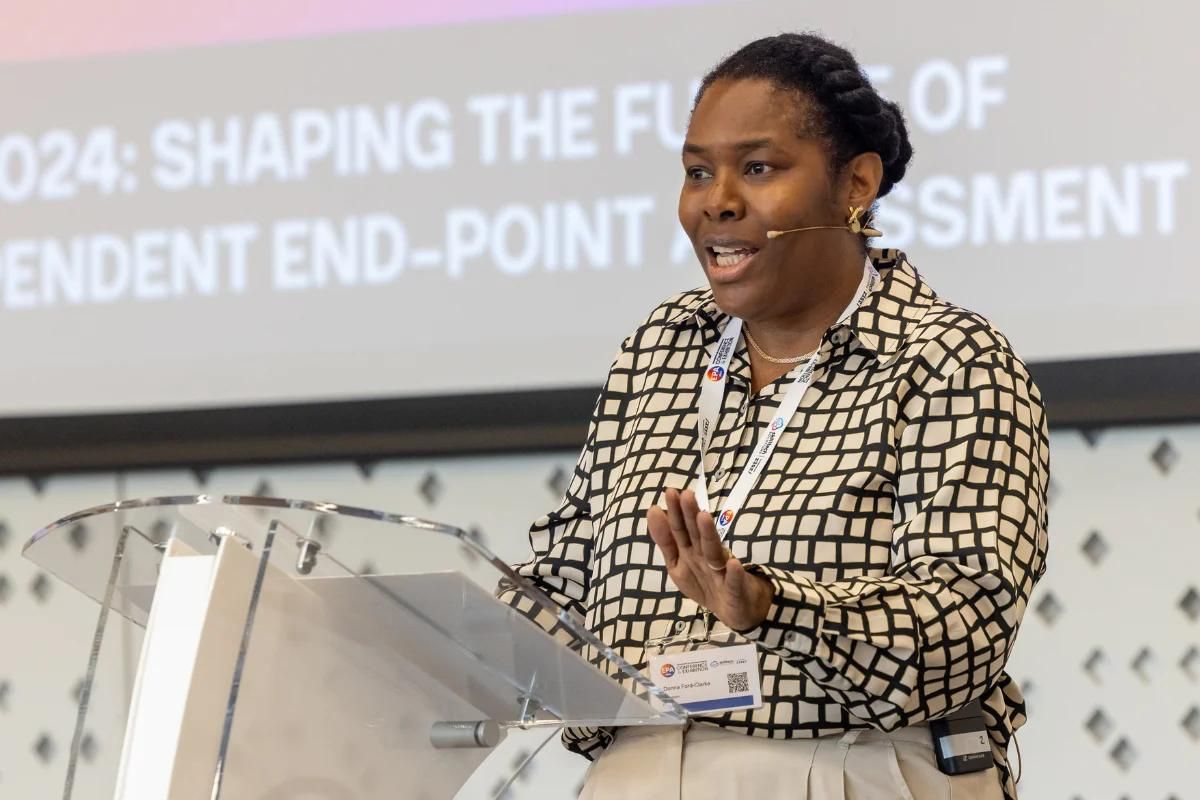Why do diverse & disadvantaged talent self-select out of apprenticeships?

Amazing Apprenticeships (@AmazingAppsUK) recently hosted our latest Time for Change webinar, which included a fascinating panel discussion with apprenticeship and recruitment specialists from the University of Oxford, House of Commons and MoD that saw us asking two big questions:
- Why do diverse and disadvantaged talent select out of certain apprenticeship opportunities?
- What can employers do about it?
These questions are so big, that they warrant a deeper dive into why the people who could gain the most from apprenticeships might opt-out of roles designed with them in mind.
What do we mean by self-selecting out?
To self-select out is to voluntarily opt out of something (in this case an apprenticeship employment opportunity) in accordance with one’s personality, background, interests or priorities.
No one makes the decision for the individual in this scenario. Although a whole range of circumstances and factors can impact the decision-making process, it is ultimately a personal choice.
The state of play
The last 12 months have seen reports from the Social Mobility Commission, Sutton Trust and others demonstrating that a whole range of diverse and disadvantaged groups are hugely underrepresented in apprenticeships.
As always, the reasons for this are multi-faceted and complex, comprising of a whole range of complicated, emotive and interconnected reasons. But one thing we do know is that potential apprentices regularly self-select of opportunities they would qualify for. Why?
What apprentices are telling us
We talk every week to apprentices and potential apprentices about these issues. They’ve told us that they have opted out of opportunities because of:
Their perceptions of an employer:
- Companies that fail to highlight diversity and inclusion in their company culture miss out on a range of candidates who self-select out of the process.
- Millennials and Gen Z cite the importance of diversity to them, and 77% of them want to work for diverse, inclusive companies.
- LinkedIn research showed that companies who talk about diversity received 26% more job applications from women.
Advertising and recruitment processes don’t feel inclusive:
- This is true for a wide range of candidates – for example, we know that 9% of candidates with disabilities drop out of job applications early because there are usability issues with a careers page or the actual application process.
- The imagery or language on an employer website or job description can be alienating.
- A simple ‘D&I statement’ on a website can feel tokenistic – simply an add on.
- If there is no long-standing reputation for inclusivity, applicants won’t even explore the opportunities.
Lack of confidence in support / progression routes:
- Supporting diverse and disadvantaged talent can be costly – from individual support to facilitated networks.
- The YEUK Youth Voice Census showed that young people are particularly worried about discrimination based on LGBT+, race, gender or disability.
- Concern about lack of support is often professional, as well as pastoral – applicants may not be confident in how valued they will be, and in medium/long-term opportunities after their programme ends.
Applicants do not understand the breadth of opportunities within the organisation:
- Being particularly well known for one thing can be a double-edged sword, for local, national and international employers.
- Employers often recruit for a range of apprenticeships outside their primary function – if this isn’t effectively communicated to potential applicants then they may not even think to look at an employer’s vacancies.
What employers are telling us
Interestingly, we hear many of the same issues from employers as we do from potential applicants:
- Brand and offer perception can be a challenge. People misunderstand the business or the breadth of opportunities on offer.
- It can be hard to find/reach the most disadvantaged – especially once people are outside of the schooling system.
- Employers struggle with approach, with internal challenges, and with joining the conversation with confidence.
- High drop-out rates occur during the application process, often due to time and/or stages in the process that aren’t accessible.
- Cultural, familial or social biases against apprenticeships are widespread.
- The number of applicants is not the issue, attracting a broad range of diverse talent is.
What’s the answer?
It’s clear that being vocal about diversity and inclusivity, genuinely bringing it into every facet of an organisation – both outward and inward-facing – is imperative to begin to address the reasons such talent self-selects out. It’s also clear it is by no means, and can never be, a quick fix. Investing in diversity and inclusivity, making it part of the core culture and ensuring it weaves seamlessly in an organisation takes work, time and commitment.
While there is no one-size-fits-all solution or silver bullet here, the panel of employers on our Time for Change webinar shared some amazing insight, experience and practical tips on how to start addressing the challenge of self-selecting out, better communicating who you are as an organisation, and making sure everyone feels welcome, support and valued.
Tom Pritchard, Employer Relationships Manager, Amazing Apprenticeships
You can catch up with the session here to find out just what The University of Oxford, Ministry of Defence and House of Commons had to say.
If you are interested in exploring the discussion further, take a look at The Genie Programme, specifically designed to motivate and engage professionals with the complex, emotive and intersectional issues that make up the D&I and social mobility agenda.
The Genie Programme
In May 2021 we launched The Genie Programme – a ground-breaking, year-long programme that empowers motivated, engaged professionals to engage fully with the complex, emotive and intersectional issues that make up the D&I and social mobility agenda.
The programme takes a deep dive into issues like those influencing the decision to self-select out, helps delegates to join the conversation with sensitivity and confidence, and empowers them to use the learning to affect real positive change in how their organisation attracts, supports and develops diverse talent.
The programme’s first cohort, featuring delegates from Coca-Cola Europacific Partners, AstraZeneca, the NHS, the Open University and more leading employers, is already underway – and we are currently taking expressions of interest from employers for the second cohort, due to start the programme in October 2021.









Responses